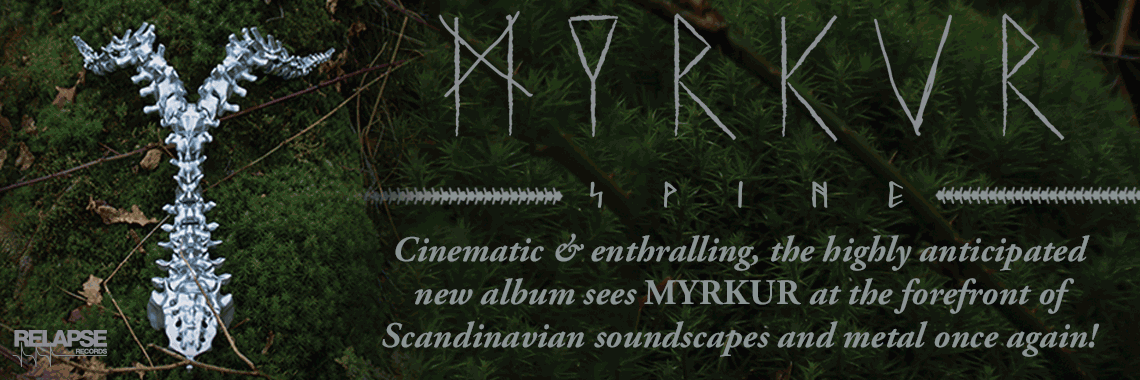
Have you ever wished that we could finally topple subgenre walls once and for all, bring them crashing down so styles as varied as Gojira’s proggy groove could collide with slamtastic Suffocation? Could we ever get artists like Joe Duplantier and Frank Mullen to contribute to the same album?
The wait is over. Long Island destroyers Car Bomb have just released their third full-length album of fucked-up, lurching heavy music that borrows from Meshuggah’s jigsawed tempos and warps the fabric even further into alien territory. Meta is their second self-released record, and if you heard 2012’s cryptically titled w^w^^w^w then you probably know where this one is headed. Spend a little time in Car Bomb’s headspace and you can be sure to either evolve or disintegrate into your very own pool of primordial goo. And yes, both Joe Duplantier and Frank Mullen lent their talents to parts of Meta.
We spoke with guitarist and songwriter Greg Kubacki for an artist profile in our January 2017 issue (#147, Metallica cover), but we could hardly bring you the entire conversation in that piece. Here’s the rest of that interview, which you should read while altering your brain chemistry with a stream of Meta from Car Bomb’s Bandcamp site.
How long have you been working on Meta? What has band life been like since you released the last record?
For the past few years we’ve been busy with our professions, since this band isn’t a full-time gig for us. I’m always writing riffs whenever I can so it’s hard to say when Meta actually started materializing. Some riffs (like the intro of “The Oppressor”) have been around for more than ten years. The final song arrangements were solidified during the summer of last year and we started rehearsing them in the fall. Recording at Silver Cord Studios started in January of this year and mixing/mastering wrapped up in July.
What were the logistics of getting contributions from Joe Duplantier (Gojira) and Frank Mullen (Suffocation) on the album? Where/how/when did they do their parts? What did they bring to those songs?
We’ve worked with Joe before on “Third Revelation” [from 2012’s w^w^^w^w) and he works super fast: throw up a mic and in five seconds he’s already screaming his guts inside out. For “The Oppressor,” we really wanted the middle section to shift gears and knew that his voice would be perfect for that. He’s beyond professional, and his parts didn’t take more than an hour to record.
The middle breakdown riff in “Sets” was one of our favorite sections of the album and we wanted to do something special for it. For ages we’ve all been huge fans of Suffocation and thought Frank’s voice would be perfect. He’s a Long Island guy so we bumped into him at a show and asked if he was down. He came up with his parts all on his own and recorded it with Joe Cincotta at Full Force Studios. The rhythmic feel he created totally throws everything off balance and makes the breakdown sound even more disorientating and heavy. It wasn’t what I was expecting at all, but I couldn’t be happier with what he came up with.
Does your songwriting process tend to be linear, or do you usually come up with lots of ideas and stitch them together later?
Most of the time it’s nonlinear. I try to write riffs every chance I get and always record everything. Then I’ll let those recordings sit on the shelf for a while. After a few months I’ll listen back with fresh ears and see if I like anything. This gives me a clear picture of what the ideas actually sound like without being attached to them as a player. After accumulating a bunch of good ideas, I’ll try to see if there’s any relationship between them and start stitching songs together. Then Mike [Dafferner, vocals] will do his thing over the song and we’ll fine-tune everything to make everything sound like one continuous idea.
What about this album worked out really well, from your perspective? Do you have any favorite parts, or part of the process?
We’ve always been really skeptical about working with other people on our previous records. For w^w^^w^w, we wrote, recorded, engineered, mixed and mastered everything ourselves. Though we enjoyed the process, it was extremely time-consuming and the result wasn’t exactly what I had envisioned. So we decided to destroy the control freaks in all of us and bring other people into the fold this time around. Immediately our first decision was to get Joe involved. He’s been a friend of the band for years and we all have tremendous respect for him as an artist and a person. He had just finished building his studio in Brooklyn called Silver Cord, which we had visited and though was a great place to record. Having him help with the producing made the recording process way more fun and inspiring. He totally understood what we were trying to accomplish but also used his visceral compass to keep us moving in the right direction. When you listen to Gojira you hear and feel the passion in their music, and though what we play can get technical at times, we wanted to make sure raw energy and emotion was always at the forefront. He made sure of that.
We were also really surprised and happy with the work our engineers did. Alexis Berthalot dialed in the drum and bass tones, which created a great sonic foundation for the record. Plus he schooled our asses in ProTools which we’ve never used before. We’ll always write in Cubase, but for making records we’re all about ProTools now (thanks Alexis!) And of course having Josh Wilbur mix and master the record was just the icing on the cake. He works in LA so we couldn’t attend the mixing session, which was scary for us, being total control freaks and all. But then he sent us a mix and we were all blown away. With barely any input from us, he really exceeded our expectations.
Check out Meta and the rest of Car Bomb’s work at Bandcamp and at their official website.







